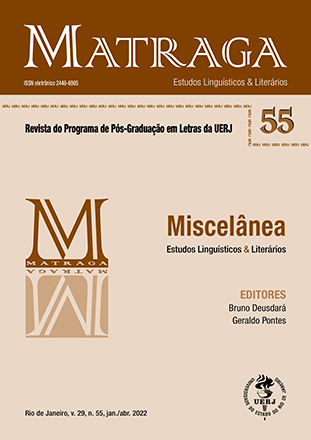Poesia e violência (O orvalho e a nódoa)
DOI:
https://doi.org/10.12957/matraga.2022.64233Palavras-chave:
Poesia brasileira. Poesia e violência. Luiza Romão. Tatiana Pequeno. Miró da Muribeca.Resumo
O debate em torno da violência é tão grande e antigo quanto a própria história dela. As perspectivas de entendimento desse fenômeno são múltiplas e mesmo antagônicas. Aqui, apresentaremos estudos de Xavier Crettiez, Octavio Ianni e Paulo Sérgio Pinheiro que, de modo complementar, nos fornecerão uma base segura para a compreensão de algumas das causas e efeitos dessa força mórbida que se expressa em variadíssimos graus e aspectos. Na sequência, veremos como, em dois poemas recentes (2019), “Fascismo self-service” de Luiza Romão e “Mulher do fim do mundo” de Tatiana Pequeno, a violência se manifesta sustentada em comportamentos hipócritas, covardes, autoritários, machistas, desumanos. Concluiremos, a partir do poema “Carla” (2002), de Miró da Muribeca, que a poesia brasileira está cada vez menos alienada (orvalho) e, portanto, mais atenta às mazelas (nódoas) de nossa sociedade.
Downloads
Downloads
Publicado
Como Citar
Edição
Seção
Licença
AUTORIZAÇÃO
A Matraga – Revista do Programa de Pós-Graduação em Letras da UERJ está autorizada a publicar o artigo ora submetido, caso seja aceito para publicação online. Fica atestado que a contribuição é original, que não está sendo submetida a outro editor para publicação, e que a presente declaração é a expressão da verdade.
Os trabalhos publicados no espaço virtual da Matraga – Revista do Programa de Pós-Graduação em Letras da UERJ serão automaticamente cedidos, ficando os seus direitos autorais reservados à Matraga. Sua reprodução, total ou parcial, é condicionada à citação dos autores e dos dados da publicação.

A Matraga utiliza uma Licença Creative Commons - Atribuição-NãoComercial 4.0 Internacional.





